高一英语必修教案全部
高一英语教案通用6篇
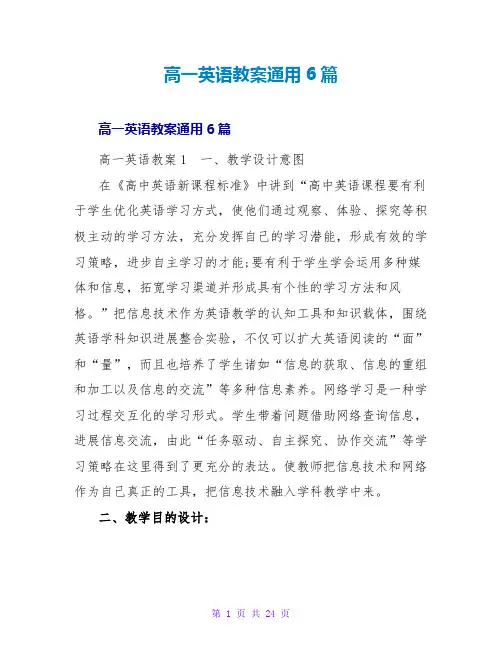
高一英语教案通用6篇高一英语教案通用6篇高一英语教案1 一、教学设计意图在《高中英语新课程标准》中讲到“高中英语课程要有利于学生优化英语学习方式,使他们通过观察、体验、探究等积极主动的学习方法,充分发挥自己的学习潜能,形成有效的学习策略,进步自主学习的才能;要有利于学生学会运用多种媒体和信息,拓宽学习渠道并形成具有个性的学习方法和风格。
”把信息技术作为英语教学的认知工具和知识载体,围绕英语学科知识进展整合实验,不仅可以扩大英语阅读的“面”和“量”,而且也培养了学生诸如“信息的获取、信息的重组和加工以及信息的交流”等多种信息素养。
网络学习是一种学习过程交互化的学习形式。
学生带着问题借助网络查询信息,进展信息交流,由此“任务驱动、自主探究、协作交流”等学习策略在这里得到了更充分的表达。
使教师把信息技术和网络作为自己真正的工具,把信息技术融入学科教学中来。
二、教学目的设计:知识与技能:①掌握快速阅读的方法,熟悉“发表看法,提出建议”的口语技能。
②充分利用网络资,强化学生自主学习的意识,培养学生组织语言、运用语言的才能。
过程与方法:①培养学生挑选局部和整体信息的才能和独立阅读才能,通过自主学习和协作学习,获取信息和处理信息的才能。
②培养学生质疑意识,分析^p 问题、解决问题、综合问题的才能和创造性思维才能。
情感价值观:通过本节课的学习,培养学生的人文和信息素养。
三、教材内容及重点、难点分析^p :教材内容:本课教学内容是新课标《高中英语必修3 Unit 5》,Canada---The True North 与以往接触过的介绍国家的文章相比,本课的内容没有整体介绍____的地理概况和风土人情,而是透过一个旅人的眼睛来看____。
相比较而言,这样的课文难度更大。
教学重点:①对课文内容的整体把握。
②学生组织语言、运用语言的才能。
【重点打破】任务驱动,层层深化。
利用“任务驱动”方法,使学生利用资自主探究、解决一系列层层深化的问题。
高一必修一英语教案(精选4篇)
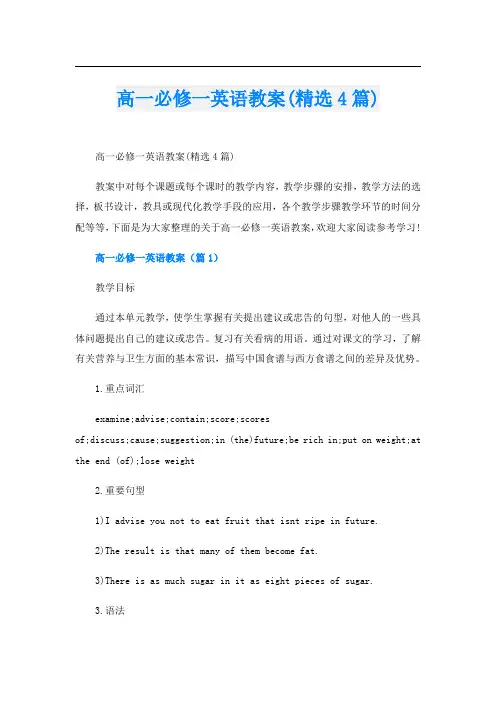
高一必修一英语教案(精选4篇)高一必修一英语教案(精选4篇)教案中对每个课题或每个课时的教学内容,教学步骤的安排,教学方法的选择,板书设计,教具或现代化教学手段的应用,各个教学步骤教学环节的时间分配等等,下面是为大家整理的关于高一必修一英语教案,欢迎大家阅读参考学习!高一必修一英语教案(篇1)教学目标通过本单元教学,使学生掌握有关提出建议或忠告的句型,对他人的一些具体问题提出自己的建议或忠告。
复习有关看病的用语。
通过对课文的学习,了解有关营养与卫生方面的基本常识,描写中国食谱与西方食谱之间的差异及优势。
1.重点词汇examine;advise;contain;score;scoresof;discuss;cause;suggestion;in (the)future;be rich in;put on weight;at the end (of);lose weight2.重要句型1)I advise you not to eat fruit that isnt ripe in future.2)The result is that many of them become fat.3)There is as much sugar in it as eight pieces of sugar.3.语法学习英语中提出建议和忠告的句型4.日常交际用语a. Seeing the doctor:1)What can I do for you? What was the matter?2)Lie down and let me examine you.3)Ive got a pain/cough/headache.4)I dont feel well.5)Theres something wrong with……6)Take this medicine three times a day.7)Drink plenty of water and have a good rest.8)Take two pills now and two more in four hourstime.b. Making suggestions and giving advice1)Youd better have a good rest.2)I advise you to do something.3)I advise you not to do something.4)I suggest that you do…5)Why not do…?6)Why dont you do…?教学建议写作建议1.首先让学生们写在练习本上,然后与同组讨论,互相交换议建议。
高一英语全英教案5篇
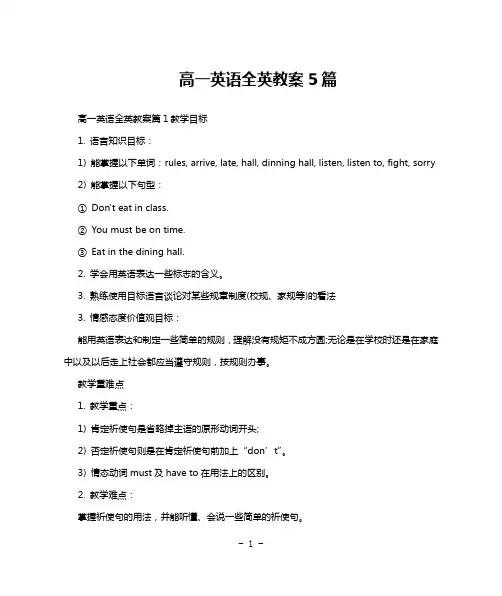
高一英语全英教案5篇高一英语全英教案篇1教学目标1. 语言知识目标:1) 能掌握以下单词:rules, arrive, late, hall, dinning hall, listen, listen to, fight, sorry2) 能掌握以下句型:①Don't eat in class.②You must be on time.③Eat in the dining hall.2. 学会用英语表达一些标志的含义。
3. 熟练使用目标语言谈论对某些规章制度(校规、家规等)的看法3. 情感态度价值观目标:能用英语表达和制定一些简单的规则,理解没有规矩不成方圆;无论是在学校时还是在家庭中以及以后走上社会都应当遵守规则,按规则办事。
教学重难点1. 教学重点:1) 肯定祈使句是省略掉主语的原形动词开头;2) 否定祈使句则是在肯定祈使句前加上“don’t”。
3) 情态动词must及have to在用法上的区别。
2. 教学难点:掌握祈使句的用法,并能听懂、会说一些简单的祈使句。
多媒体教学过程Ⅰ. Warming-up and revision教师进教室后,使用祈使句请学生们完成一系列动作:Please stand up/ sit down. Close the door, please. Look at me and listen to me.Don’t open your books. Don’t talk. Let’s begin our class.学生听教师的指令完成各种动作,教师也可将指令写到黑板上,让学生从视觉上考察祈使句的特点。
Ⅱ. Presentation教师出示书上1a 的图片,向学生提问。
指着图上奔跑的男孩提问T:What’s the boy doing? S: He’s running.T: Where is he running? S: He’s running in the hallways.(板书,教读)T:Can you run in the hallways? S: No, I can’t.T: So please don’t run in the hallways.(板书,教读)(= You can’t run in the hallways.)学生跟读数遍,明白祈使句和“can”的表达含意。
高一英语必修一教案(优秀5篇)
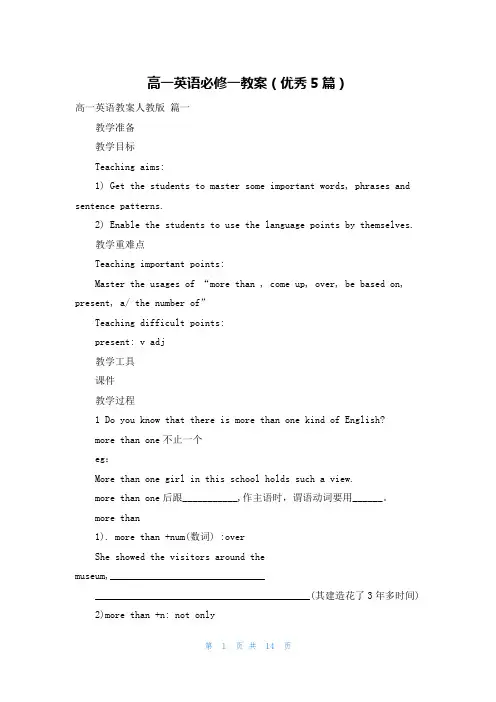
高一英语必修一教案(优秀5篇)高一英语教案人教版篇一教学准备教学目标Teaching aims:1) Get the students to master some important words, phrases and sentence patterns.2) Enable the students to use the language points by themselves.教学重难点Teaching important points:Master the usages of “more than , come up, over, be based on, present, a/ the number of”Teaching difficult points:present: v adj教学工具课件教学过程1 Do you know that there is more than one kind of English?more than one不止一个eg:More than one girl in this school holds such a view.more than one后跟___________,作主语时,谓语动词要用______。
more than1). more than +num(数词) :overShe showed the visitors around themuseum,__________________________________________________________________________(其建造花了3年多时间) 2)more than +n: not onlyMusic is more than just a sound--- it’s a way of thin king.3) more than +adj/v : very听到这个消息我很高兴。
新课标高中英语1必修全册教案
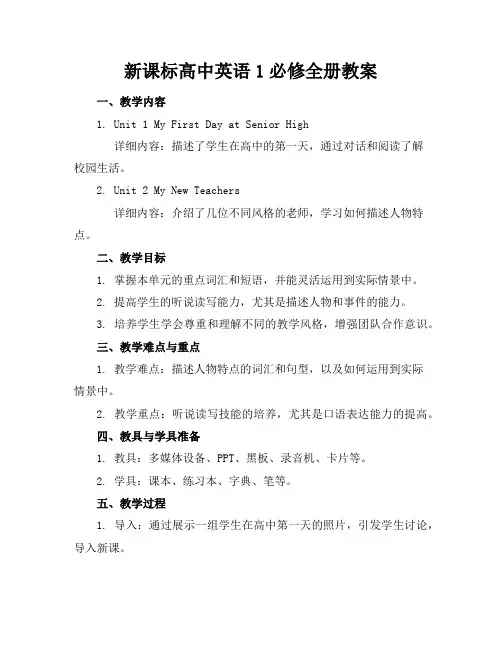
新课标高中英语1必修全册教案一、教学内容1. Unit 1 My First Day at Senior High详细内容:描述了学生在高中的第一天,通过对话和阅读了解校园生活。
2. Unit 2 My New Teachers详细内容:介绍了几位不同风格的老师,学习如何描述人物特点。
二、教学目标1. 掌握本单元的重点词汇和短语,并能灵活运用到实际情景中。
2. 提高学生的听说读写能力,尤其是描述人物和事件的能力。
3. 培养学生学会尊重和理解不同的教学风格,增强团队合作意识。
三、教学难点与重点1. 教学难点:描述人物特点的词汇和句型,以及如何运用到实际情景中。
2. 教学重点:听说读写技能的培养,尤其是口语表达能力的提高。
四、教具与学具准备1. 教具:多媒体设备、PPT、黑板、录音机、卡片等。
2. 学具:课本、练习本、字典、笔等。
五、教学过程1. 导入:通过展示一组学生在高中第一天的照片,引发学生讨论,导入新课。
2. 新课内容展示:讲解Unit 1 My First Day at Senior High 的重点词汇和句型,进行角色扮演活动。
3. 例题讲解:针对Unit 2 My New Teachers,讲解如何描述人物特点,给出示例。
4. 随堂练习:让学生运用所学知识,描述自己的老师,进行小组讨论。
5. 口语练习:模拟情景,让学生进行对话练习,提高口语表达能力。
六、板书设计1. Unit 1 My First Day at Senior High重点词汇:nervous, excited, confused, helpful, friendly等。
重点句型:I felt when; The teacher is and he/she等。
2. Unit 2 My New Teachers描述人物特点的词汇:strict, patient, humorous, knowledgeable等。
描述人物特点的句型:My teacher is; He/She always等。
高一英语教案(6篇)
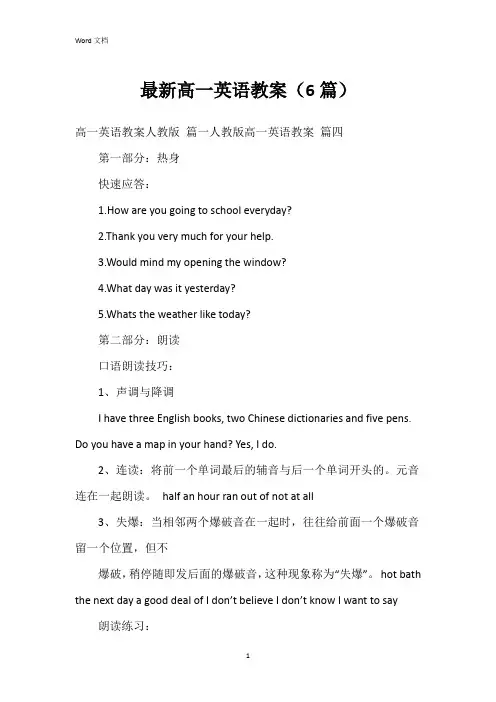
最新高一英语教案(6篇)高一英语教案人教版篇一人教版高一英语教案篇四第一部分:热身快速应答:1.How are you going to school everyday?2.Thank you very much for your help.3.Would mind my opening the window?4.What day was it yesterday?5.Whats the weather like today?第二部分:朗读口语朗读技巧:1、声调与降调I have three English books, two Chinese dictionaries and five pens. Do you have a map in your hand? Yes, I do.2、连读:将前一个单词最后的辅音与后一个单词开头的。
元音连在一起朗读。
half an hour ran out of not at all3、失爆:当相邻两个爆破音在一起时,往往给前面一个爆破音留一个位置,但不爆破,稍停随即发后面的爆破音,这种现象称为“失爆”。
hot bath the next day a good deal of I don’t believe I don’t know I want to say 朗读练习:1、A smart housewife was told that there was a kind of stove which would onlyconsume half of the coal she was burning. She was very excited, and said: Thatll be terrific! Since one stove can save half of the coal, if I buy two, no coal will be needed!2.The little boy did not like the look of the barking dog.Its all right, said a gentleman, dont be afraid. Dont you know the proverb: Barking dogs dont bite?Ah, yes, answered the little boy. I know the proverb, but does the dog know the proverb, too?高一英语教案人教版篇五教学准备教学目标Knowledge and ability: To help the Ss know about the history of the Amber room and develop their reading skills.Process and method: Ss acquire knowledge and improve ability through discussion and competition.Emotion, attitude and values: to arouse Ss's awareness of protecting the cultural relics. Understand cultural relics belong to the whole world and the human beings.教学重难点important point: Understand the content of the whole passage andmaster the different reading skills,such as ,skimming, scanning and so on.difficult point : how to solve the questions and find the useful information using the reading skills.教学工具课件教学过程Lead in1. show some pictures .2. show the pictures and a short video of amber room.purpose: motive Ss's interest.Hi, everyone. Let’s look at the screen. I’ll present you some pictures. They are all about cultural relics. Some of them are cultural sites. Some of them are natural sites. Only an international professional organization from UN has the right to decide on and name them.PresentationLook at the photos here. What do you know about the substance of “amber”? What do knowabout the cultural relics “the Amber Room”?discussion:Now, boys and girls, I met a “moral dilemma”。
高一英语必修一教案6篇
高一英语必修一教案6篇高一英语必修一教案篇1period 1pre-class task: about vocabulary of item in the olympic gamesstep 1 word game:part 1: each group get 4 words to guess. one points for each.part 2: the quickest to match the word correctly can get 2 points for his/ her group, but if the answer is wrong,1 points will be lost.shot put 击剑discus throw 摔跤javelin throw 悬挂式滑翔marathon 冰球canoeing 举重ice hockey 马拉松weightlifting 划独木舟wrestling 铁饼fencing 推铅球hang-gliding 标枪part 3: the quickest to guess the word correctly can get 2 points for his/ her group, but if the answer is wrong,1 points will be lost.rings, high bar, side hors(鞍马)e, vaulting horse(跳马), double bar, free exercisesstep 2 warming uptalk about when ,where, and anything you know about the olympics according to the pictures given.1. get ss to talk about picturesteacher can give one example2. let 2 ss share their understanding of the pictures and act it out for the classstep 3. speaking activity 1 ( warming up p17)page 49 now turn to page 49 and look at exx.1&21.read through the words and fill in the form2.work in pairs and make a simple dialogue using the information in the form by asking:do you know which sports are usually part of the winter olympics?which sports are played between team?in which sports are chinese athletes the best?3.pairs to act it outstep 4 speaking activity 2teacher help the ss to talk about their hobbies(about sports) by teaching them some expression.1. show some useful expressasking about giving answer, advice, and making decisiontaking about hobbies:1)which sport do you like best?what’s your favorite s port?what are your hobbies?which do you prefer, ..or..?are you interested in …?2)why do you like…?/what do you learn from…3)how do you bee good at them?4)can you tell me sth. about them? giving answer, and making decision:1)i prefer…(to)…/ i like …(best).2)i (don’t) like (because)…3)i (don’t) think…(it’s because)…4)i’m sure that…5)i’m not sure whether…6)there is no doubt…7)don’t you think that…?2. explain them if necessary.3. give some words of sports for ss to talk with their partner.4. act it outstep 6 homework1.find out the fact in warming up to the number given to you (it’ll be checked tomorrow)2.finish exx.1-4 on p11-123.《课程探究》exx 1&24.go over the new words.period 2step 1 number gamehave the ss to open the book on page 9, try to match the number to the events. the one who get the closest answer will get 1 point of the group1. show the number to the ss2. have the ss write down the answers by filling with the number in the table776 b. c. the ancient olympic games start in greece.393 a. d. the ancient olympic games stop1896 the modern olympic games start in greece.311&13 the numbers of petitors & countries took part in 18961932 china first joined in the games.1984 china first got gold medal by xuhaifeng.10.000&119 the numbers of petitors & countries joined in sydney olympicchina got the 2th place in athens.china will host the 29th summer olympics in beijing.3. check and give points to the group.step 2 pre-readingshowing the motto of the beijing 2008 olympic games bid (北京奥运申报口号) to the whole class.1. raise a question: “do you know more about the olympics history?”2. get the ss to read about an interview to get more.3. get the ss to make sure the relationship between pausanias and lilistep 3 reading prehensionread the olympic games1. make sure the information they have to get:the 29th olympics the old olympicsthe olympic gamesthe 27th olympics the modern olympics1st time: read the text quickly and find out the answers to the following qs:1). the old olympics: when / where / who/what to get2). the modern olympics: how often / how many sets / who3). the 27th olympics: when / where to live/ for the spirit of…4). the 29th olympic: when / where/ what to get2nd time: read the text carefully and answer the question on page 11,have the ss:. 1.read the passage again and find out the answers to the questions in ex 22.discuss the answers with your partner3.tell the whole class the answersstep 4 summing up1 individual work, take out a piece of paper to sum up the text2.pair work: “close the books, talk about the olympics with what you have learnt & your own knowledge.”3.act it outstep 5 homework1.《英语周报》知识点练习和短文改错2.finish ex.1 of a table on p113.p50 ex.2, p51 reading task4.go over notes on page 78-79.period 3 & 4step 1 homework checking & motivating1.check the homework2. talk the motto of modern olympic games:swifter/faster, higher, strongerstep 2 language points1. ss give the phrases and expressions according to the chinese t gives2. ss raise qs on some difficult points they found while reading the textreading text:1. take part in/join in 参加2. the spirit of ……精神、宗旨、灵魂3. used to 过去常常4. find out 查明,找出5. every four years 每四年,每隔三年6. all over the world (遍及)全世界7. a set of 一套,一组8. pete with/against 和……竞争9. pete for… 为……而竞争10. be admitted to 获准做某事11. be admitted as 作为…被接受12. reach the standard 达到……水平、标准13. play an important role/part in 在……方面扮演重要角色(起重要作用)14. as well as 和……一样15. think you for your time 感谢您(能抽空……)16. e from the same root 同根17. have (no) chance of doing sth. 有(没)做……的机会18. go with 伴随,与……搭配19. relate…to… 把……与关联起来20. relate with 和……有关21. run against… 和……赛跑22. hear of 听说23. make sure 确定24. take turns 轮流25. one after another 一个接一个take part in 参加take part in, join, join in, attend的区别take part in 指参加某种活动,如体育、比赛、游戏、讨论、战斗等,并积极地起着作用。
高一英语教案6篇
高一英语教案6篇2023高一英语教案篇1一、教材分析:同学在度过一个假期后,英语学问较生疏,老师应当复习好平常单词,为学习新知打下基础。
Let’s talk A部分特殊好地体现了这一点。
Good morning We have a……复习民第一册中内容。
“I’m from America”这一句为 B Let’s taik“Where are you from?做了铺垫,老师应充分留意这一点boy、girl 、teacher student 、meet等单词又是第一次消失,也需要我们特不关注。
二、教学目标:1、能够得简洁地表达自个儿心情,如:nice to meet you welcome back to school2、能够听知道并回答 Where are you from?I’m from3、熟识、会讲字母A——E4、把握A、B Ler’s talk中单词。
5、理解A、B Ler’s talk中内容。
三、教学重、难点:能够听知道并回答 Where are you from?把握A、B Ler’s talk中单词。
理解A、B Ler’s talk中内容。
四、课时支配第一课时 A lLet’s talk Let’s learn B Let’s sing其次课时 A Let’s practise Let’s play Let’s chant第三课时 B lLet’s talk Let’s learn第四课时 BLet’ssay Let’spractise第五课时B Let’s Let’s第六课时 C story time2023高一英语教案篇2一、教材分析:本课是结合人教版高中英语教材选修5中有关过去分词的语法内容,进行过去分词的学习,教学中将语法学问的传授和语言差不多技能的学习结合到一起,留意复习语法与语言的运用。
接受任务型教学法和小组合作探究学习法,从而扩大课堂的语言输入量及同学的语言输出量。
2023最新-高一英语必修一教案(精选5篇)
高一英语必修一教案(精选5篇)时间过得太快,让人猝不及防,成绩已属于过去,新一轮的工作即将来临,现在的你想必不是在做计划,就是在准备做计划吧。
什么样的计划才是有效的呢?这次漂亮的小编为亲带来了5篇高一英语必修一教案,我们不妨阅读一下,看看是否能有一点抛砖引玉的作用。
高一英语必修一教案篇一高一英语对于学生来说具有承上启下的关键作用,以下是“高一英语必修课件”希望能够帮助的到您!高一英语必修一知识:动词-ing形式作主语1. 动词-ing形式作主语时,主要有三种形式。
(1)动词-ing直接置于句首主语的位置上Playing tricks on others is something we should never do.捉弄别人是我们万万不能干的。
Saying is easier than doing.说起来容易做起来难。
(2)用it作形式主语,而把真正的主语移置句尾,以保持句子平衡。
常见句型有:It is / was a waste of time / money doing ….做……是浪费时间或金钱It is / was useless / no use / no good doing …做……是无用/无益的It is/was worth/worthwhile doing …做……是值得的It is no use crying over spilt milk. 覆水难收。
It’s worth making the effort. 这事值得去做。
It’s a waste of time arguing about it. 争辩此事是在浪费时间。
(3) 在there is no 结构中通常用动词-ing形式作主语常见的句型有:There is/was no doing… 无法在……;不允许……There is/was no sense (in) doing… 做……没有道理/意义There is/was no use/ point (in ) doing… 干……无意义There is no joking about such matter.这种事开不得玩笑。
高一英语必修一教案范文5篇
高一英语必修一教案范文5篇学习一个多么熟悉亲切的名词。
从呱呱落地后我们便开始了欢乐多彩的学习旅程。
牙牙学语、懵懂入学我们一步一步登上学习阶梯。
下面是课件我为您推荐高一英语必修一教案范文5篇。
高一英语必修一教案最新范文1 教学准备教学目标1. 通过学生分享自己的旅游经历,用英语进行交流与表达。
2. 通过略读与找读,使学生获取文章主要信息,练习阅读技巧。
3. 通过小组讨论为旅游准备的物品,使学生用英语简单的语言实践活动。
教学重难点教学重点:利用阅读技巧,获取文章大意及细节教学难点:用英语交流并进行简单实践活动旅游需要准备的物品教学过程I、Warming Up:1. Id like to share my travelling e_perience with you,and would you like to share your travelling e_perience?2. The world has many great rivers. Have you been to these rivers?设计意图:大部分学生都喜欢旅游,老师谈谈自己旅游的经历,询问学生的旅游经历。
列举世界上的河流图片,让学生来欣赏认识美好的河流。
能有效地调动学生的学习积极性。
河流图片的展示,学生猜测河流的名字,唤起学生的学习兴趣以及对大自然的热爱。
II. Pre-readingHave you been to the Mekong River? What countries does the Mekong River flow through?设计意图:展示沿湄公河的地图,引起学生的兴趣,让学生观察地图,说出湄公河流经的国家,为随后的阅读做好了内容和词汇上的铺垫。
III. Reading1. SkimmingSkim the passage and find the main idea for each paragraphPara 1: DreamPara 2: A stubborn sisterPara 3: Preparation设计意图:略读:学生快速浏览课文,寻找相关信息并搭配段落大意。
- 1、下载文档前请自行甄别文档内容的完整性,平台不提供额外的编辑、内容补充、找答案等附加服务。
- 2、"仅部分预览"的文档,不可在线预览部分如存在完整性等问题,可反馈申请退款(可完整预览的文档不适用该条件!)。
- 3、如文档侵犯您的权益,请联系客服反馈,我们会尽快为您处理(人工客服工作时间:9:00-18:30)。
Unit 1 Festivals around the world I.单元教学目标II.目标语言1. 教材分析本单元以节日为话题,介绍古今中外节日的种类、由来、意义以及人们的活动和习俗,旨在通过本单元的学习使学生不但了解我国的节日,而且对外国的节日也有所了解,进而拓展社会文化背景、增加跨国文化知识;使学生复习和巩固运用请求和感谢的表达法,掌握情态动词的用法;并尝试根据阅读的文章写一个不同的结局,能表达自己的观点和想法。
1.1 Warming Up 旨在通过表格引导学生讨论并列举出五个我国节日的日期、庆祝内容和民俗。
可以刚刚过去的春节为话题导入对节日的讨论;使他们由自己的经历谈起,扩展到别的节日以及外国的重要节日,激发学生的兴趣,激活他们关于节日的背景知识,为本单元的学习做准备。
1.2 Pre-reading是Reading 的热身活动。
主要通过两个问题引导学生思考并讨论自己最喜欢的节日及欢度方式,进而了解学生对节日的认识,以便为阅读作好铺垫。
1.3 Reading 的五篇小短文分别介绍古代节日、亡灵节、纪念名人的节日、丰收节、春天的节日等,使学生了解各种节日的由来及其存在的意义。
此部分载有Festivals的重要信息,还呈现了大量的词汇和主要的语法---情态动词的用法。
处理时应作为重点、整体处理,通过上下文来教词汇、语法,并引导学生分析长句、难句和复杂句。
1.4 Comprehending是考察对阅读内容的进一步理解。
练习一:六个问题让学生对文章内容有浅层理解并考察课文细节,但又不能仅仅拘泥于课文,要引导学生理解课文内容的基础上联系现实生活。
练习二:要求学生讨论哪些节日是最重要的,哪些是最有趣的,以表格的形式检查学生对所读节日的理解,并训练他们举一反三的归纳和推理能力。
练习三:要求学生找出各种节日共有的三件事,然后讨论为什么这些事对各地的人们都很重要。
这就要求学生不仅要温习文章内容而且要结合实际,阐述自己的想法,挖掘学生的思维能力和语言表达能力。
1.5 Learning about Language 分词汇和语法两部分。
其中Discovering useful words and expressions是本单元单词的英文释义练习和用文章中的词汇的适当形式填空;Discovering useful structures 是以文章内容为载体在语境中练习语法,掌握情态动词。
由此可以看出本教材已明显地由结构为特征的传统语法训练转变到以交际功能为特征的功能语法训练,充分体现了新教材话题、功能、结构相结合的特点。
1.6 Using Language 是英语听说读写的全面运用的练习。
1.6 ① Listening 是课文的延伸,通过听几位学生参加Trinidad Carnival 节日游行的两段对话,使学生体会参加节日游行的真实情景,既训练听力一通过问题训练了他们的分析能力。
1.6 ② Speaking 分为两部分。
第一部分通过电话突出交际用语功能的训练;第一部分让学生编对话,可以按自己的想象、经历为内容,训练思维和表达能力。
1.6 ③ Reading 是发生在情人节的一个令人伤心的爱情故事,其中又插入了一个“七巧节”的故事。
阅读后的讨论不仅帮助学生理解文章主旨大意,更重要的是让学生学会寻求解决问题的方法。
1.6 ④Writing 的任务是写一个与文章结尾不同的结局。
旨在让学生通过思考写出自己的想法,尝试自己解决问题。
总之,通过本单元的系统学习,让学生了解世界各国的节日及民俗,学习有关节日的词汇,并能够丰富语言知识,提升用英语表达观点的能力。
2. 教材重组2.1 口语从话题内容和功能上分析Warming Up 与Workbook中的Listening和Talking相一致,旨在启发学生讨论、思考并引出本单元关于节日的话题,可以整和成一节任务型“口语课”。
2.2精读可将Pre-reading、Reading、Comprehending三个活动整和成一节“阅读课”。
2.3语言学习将Learning about Language与Workbook中的Using words && expressions Using structures结合在一起,上一节“语言学习课”。
2.4听力可将Using language中的 Listening与Workbook中 Listening和Listening task放在同一节课中处理,上一堂 "听力课"。
(Using language中的Speaking可视听力时间而定,可课上处理亦可留做课下作业下堂课提问。
)2.5. 泛读可将Using Language中的Reading &&Writing和Workbook中的Reading Task上成一节 "泛读课"。
2.6 复习、写作可将Workbook中的Speaking Task 和Writing Task 上成一节复习写作课。
(Workbook中的Project && checking yourself, 可视学生水平安排在本堂课或留做作业。
)3. 课型设计与课时分配 (经分析教材, 本单元可以用5课时教完。
)1st period Speaking2nd period Reading3rd period Learning about Language4th period Listening5th period Extensive ReadingThe 1st period Speaking教学目标1). knowledge & skillsVocabulary: take place, lunar, festival, Army Day, Christmas, dress up Phrases: Would you like …Could I have…?Might I offer help…?May I see…?You should try…Could we like at…Can you suggest…?We might take…2). process & method3). emotion, attitude & value2.Teaching?emphasis on the difficulties:3.Teaching preparation:4.Teaching Procedures;Step I Leading inT: Hello, everybody! Welcome back to school! Did you have a good time inyour winter holidays?Ss. Yes. Of course!T: When did you feel most happy and excited?Ss: At the Spring Festival.T: Who can tell us why? Any volunteers?S1: Because it is the most important festival in our country.S2: Because I got a lot of lucky money from my parents.S3: Because I needn’t study at festivals and there was a lot of delicious foodto eat. How great.S4: Because I met my cousins and friends who I hadn’t seen for a long time.T:Very food! I am glad to hear that. Today we will talk about festivals, which are meant to celebrate important events. Please think about some other festivals. Can you name just a few?Ss: New year, Yuan xiao festival…T: Quite right. That’s called the Lantern’s Festival. How about some other festivals?Ss: The Army Day, International Labour’s Day, National Day, Tomb Sweeping Festival, Dragon Boat Festival, Mid-au tumn Day…T: You have done a good job, boys and girls! .StepⅡ Warming –upFestivals are meant to celebrate important events. Different countries have different festivals. Work in groups and lost five Chinese festivals that you know. Discuss when they take place, what theycelebrate and one thing that people do at that time. The first one is given to you as an example.StepⅢ Pre- readingDiscuss in groups of four1.What’s your favourite holiday of the year? Why?2.What festivals or celebrations do you enjoy in your city or town? Do you like spending festivals with your family or with friends? What part of a festival do you like best---the music, the things to see, the visits or the food?StepⅣ Assignment1.Consolidation2.Listening to the material again after class to be familiar with it.3.Homework: Collect as much information about festivals as possible. StepⅤ Reflection after teachingThe 2nd period Reading教学目标1.Vocabulary:starve, starvation, plenty, satisfy ancestors,lamps,lead,feast,bone,origin, in memory of,dress up,trick,poet,arrival,national,gain independence,gather agricultural,European,custom,awards,watermelon,handsome,rooster, admire, look forward to, religious, as though, have fun with, daily 2.To enable the students to know the earliest festivals with reasons for them and four different kinds of festivals that occur in most parts of the world3.To enable the students to master some English expressions and phrases about festivals.Teach the basic reading skills: skimming and scanning.Try to compare and make conclusion s of different festivals.StepⅠ Revision1.Greetings.2.Review the new words of this part.3.Check the students’ homework---festivalsStepⅡ Reading1.ScanningT: Open your books and turn to page one. I’d like you to do the scanning. Read the text quickly and accurately to get the main idea and answer the 6 questions on Page3.( Ask the student to look through the questions and then read the text silently.)( Four minutes later, check the answers with the whole class. Show the suggested answers on the screen.)2.Intensive reading( Allow the students to read aloud and carefully this time to understand the main ideas of each paragraph and the important details)T: Read the text loudly for a second time and them try to tell if these sentences are True or False.3.Reading and discussionT: Read the text a third time and then work impairs to do Exercise 2 on Page 3.( Let the students have enough time to read the passage carefully and discuss the chart with their partners. Encourage them to expand their answers according to their own experiences.)4.Explanation(In this part try to help the students analyse the difficult, long and complex sentences and guess the meaning of the new words; ask them to deal with the language points in the context.)T: Now I will discuss some important sentences and phrases in the passage.a.Some festivals are held to honor the dead, or satisfy and please the ancestors, who could return either to help or to do harm.b.in memory ofc.In India there is a national festival on October 2 to honor Mahatma Gandhi, the leader who helped gain India’s independence from Britain.d.People are grateful because their food is gathered for the winter, and because a season of agricultural work is over.e.The most energetic and important festivals are the ones that look forward to the end of winter and to the coming of spring.f.The country is covered with cherry flowers so that it looks as though it might be covered with pink snow.The suggested explanation:a.An attributive clause.The sentence means people hold some festivals either to show respect to the dead or to make their ancestors happy in case they might come back to do harm.b.in memory of … serving to recall sb, to keep him fresh in people’ minds.He wrote a poem in memory of his dearest wife, who died in an accident.in honor of ( showing great respect or high public regard)in hopes/the hope of (hoping)in defence of (defending)c.a noun phrase followed by an attributive clause as the appositived.two clauses for reasone.energy→energetic adj. ( full of or done with energy)look forward to ( to is a preposition here.)devote to, be/get used to, get down to , stick toe.g. I’m looking f orward to hearing from you.StepⅢ ListeningT: Now I will play the tape for you. You can just listen with your books closed or look at your books or read in a low voice together with the tape. It’s up to you. After listening, please write down three thing s that most festivals seem to have in common.( Comprehending Ex.3 on Page 3).StepⅣ Reflection after teachingThe 3rd period Learning about language教学目标1.Let the students know the usage of modal verbs.2.Enable the students to recognize the words and expressions in thereadingpassage according to what mean the same as them.StepⅠ Greeting and RevisionAsk some students to retell the text we learned .StepⅡ. Practicing the useful words and expressionsT: As we know, there are two important kinds of verbs---transitive verbs and intransitive verbs. But many intransitive verbs have the structure “verb+preposition+objects ” Can you give me some examples? Ss: Sure. Such as look at the picture, hear from my friends, listen to the radio and so on.T: Ok. Now turn to page 4, Ex. 4. You are to make some sentences of your own, using the words given.S1. I’m looking forward to hearing form my friendS2: We are talking about verbs.S3: Would you like to talk with me?S4: Who can think of an effective solution to the problem?S5: Please think about my proposal.StepⅢ Useful StructuresT: Let’s come to the next part. This part is about modal verbs. You are to read the sentences in Ex. 1 and then to find out and write down different sentences with modal verbs form the reading passage and try to explain their meanings. If you have any difficulty in understanding them you can refer to Grammar in Pages 92---94StepⅣ Summing up and home workT: Boys and girls, today we have practiced useful words and phrases of this unit and the usage of modal verbs. I think it is not easy for you to master them, after class you should review them.Homework1.Practice of WBP42EX.1,2,3.2.Please find out10 sentences with modal verbs, and try to get their meanings.StepⅤ Reflection after teachingThe 4th period Listening教学目标1.Vocabulary: go with, the big bands, musicians, over and over again, for sale, get used to, the winners of this year’s awards for the best costumes2.Enable the students to know how to get the key words to understand theconversation about the carnival parade, to talk about sth happened and express request and thanks.StepⅠ RevisionAfter checking the WB Ex. 1,2,3 the teacher ask the students to give examples about modal verbs and try to explain them.StepⅡ Warming upT: By the way, what’s the topic of this unit?Ss: Festivals around the world.T: Would you like to know something more about festivals around the world?Ss: Of course.T: Now I will show you several pictures. What’s the festival called? StepⅢ ListeningT: I will play the tape for you twice. Please listen carefully and paymuch attention to the important points. For the first time you are to make notes beside the questions. For the second time, you should write down the answers and then check them with your partners.( It’s important to encourage the students to adapt their present knowledge anyskill to a variety of situations wherever they can. Make sure to allow variousexpressions of the answers. Do not demand the same words form all students.)StepⅣ SpeakingThis part is intended to give the students the opportunity to practice atelephone conversation using the functional items for requests and thanks. The polite form of English are important and should be practiced in a variety of situations.StepⅤ Listening taskT: There are about 10 minutes left. Let’s come to listening task.Turn topage 43 and look at the pictures. They have something in common. Can you find it out?Ss: They are all about festivals bout the dead.T: That’s right. I will play the tape for you. For the first time you should tryto write down the name of the country where the festival are held. For the next two times you should do Ex2. You can make a brief note first and then complete the chart, according to which you can make a report. StepⅥ Reflection after teachingThe 5th period Extensive reading教学目标1.Vocabulary: heart-broken, turn up, keep one’s word, hold one’s breath, drown one’s sadness in coffee, set off for, remind somebody of something,2.Learn to compare the festivals in China and in western countries. StepⅠ RevisionCheck homeworkStepⅡ Reading (1)T: As we know, there are all kinds of festivals around the world. We have talked about two Chinese festivals for the dead. Today we are going ti read a sad story, which is to introduce a cross cultural view of lovers’ festival—Qi Qiao and Valentine’s Day. Now please read it quickly and find out the sentence below are true or false.T: I think you have got the general idea of the passage. Now please read the passage once more and answer the questions on Page 8.Some language points:StepⅢ Discussion and writingT: That’s for the reading part of the passage. Please think about the endingof the story. Are you satisfied with the ending? Different people have different opinions to a matter. Now any one of you have an opportunity to make up an ending to the story. Please engage imaginatively in the story and use your ownideas. Try to use the vocabulary and structures you have learned of you like.StepⅣ Reading(2)T: Let’s come to another passage about carnival in Quebec. Please turn to Page 44, read it quickly and answer the questions in Page 45. Five minutes for you.Unit 2 Healthy eating I.单元教学目标II.目标语言Ⅲ. 教材分析与教材重组1. 教材分析本单元以“健康饮食”为中心话题,通过单元教学让学生了解各种食物对人体的作用,引导学生关注平衡膳食,促使学生养成健康饮食的习惯。
